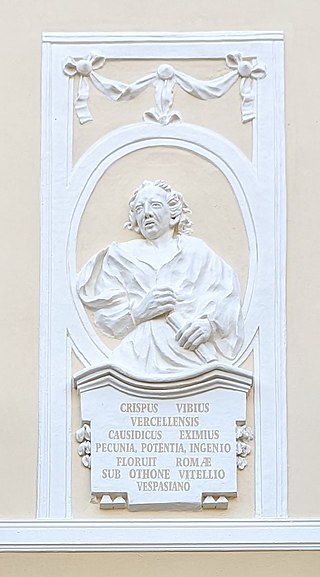Related Research Articles
The gens Sulpicia was one of the most ancient patrician families at ancient Rome, and produced a succession of distinguished men, from the foundation of the Republic to the imperial period. The first member of the gens who obtained the consulship was Servius Sulpicius Camerinus Cornutus, in 500 BC, only nine years after the expulsion of the Tarquins, and the last of the name who appears on the consular list was Sextus Sulpicius Tertullus in AD 158. Although originally patrician, the family also possessed plebeian members, some of whom may have been descended from freedmen of the gens.
Publius Petronius Turpilianus was a Roman senator who held a number of offices in the middle of the 1st century AD, most notably governor of Britain. He was an ordinary consul in the year 61 with Lucius Junius Caesennius Paetus as his colleague.

A consul was the highest elected public official of the Roman Republic. Romans considered the consulship the second-highest level of the cursus honorum—an ascending sequence of public offices to which politicians aspired—after that of the censor, which was reserved for former consuls. Each year, the Centuriate Assembly elected two consuls to serve jointly for a one-year term. The consuls alternated each month holding fasces when both were in Rome. A consul's imperium extended over Rome and all its provinces.
Appius Junius Silanus, whom Cassius Dio calls Gaius Appius Silanus, was consul in AD 28, with Publius Silius Nerva as his colleague. He was accused of majestas, or treason, in AD 32 along with a number of senators, but he and Gaius Calvisius Sabinus were saved by one of the informers, Celsus, a tribune of a city cohort.

Lucius Volusius Saturninus was a Roman senator from the powerful plebeian Volusia gens, or family. He held several offices in the emperor's service. Saturninus attracted the attention of his contemporaries for his long life: he died at the age of 93, and having sired a son at the age of 62.
Lucius Junius Caesennius Paetus was a Roman senator, and member of the gens Caesennia and Junia, who held several offices in the emperor's service. He was consul ordinarius for the year 61 as the colleague of Publius Petronius Turpilianus. Judith Ginsburg notes this made him the first novus homo to reach the ordinary consulship since Quintus Veranius 12 years before.

Lucius Junius Quintus Vibius Crispus was a Roman senator and amicus or companion of the Emperors, known for his wit. He was a three-time suffect consul.
Servius Cornelius Scipio Salvidienus Orfitus was the name of several Roman men who lived during the early Roman Empire. They were descendants of Orfitus who was adopted by Servius Cornelius Scipio, an otherwise unknown member of the patrician branch of the Cornelii Scipiones.
Titus Flavius Postumius Titianus was a Roman politician who served as senator and consul suffectus.
Cossus Cornelius Lentulus was a Roman senator who flourished during the Principate. He was the consul posterior as the colleague of the emperor Nero in AD 60.
Gaius Laecanius Bassus Caecina Paetus was a Roman senator of the early Roman Empire, whose known career flourished under the reign of Vespasian. He was suffect consul in the nundinium of November to December AD 70 as the colleague of Lucius Annius Bassus.

Lucius Funisulanus Vettonianus was a Roman general and senator during the reigns of the Flavian emperors. He was suffect consul in the nundinium of September to October 78 with Quintus Corellius Rufus as his colleague.
Tiberius Julius Candidus Marius Celsus was a Roman senator who lived during the Flavian dynasty. Contemporary sources, such as the Fasti Ostienses, the Acta Arvalia and a letter of Pliny the Younger, refer to him as Tiberius Julius Candidus. He was twice consul.
Aulus Ducenius Geminus was a Roman senator active in the first century AD. Geminus is best known as Galba's appointment as Urban prefect of Rome during the Year of Four Emperors.
Gnaeus Cornelius Lentulus Gaetulicus was a Roman senator, who flourished under the reign of Nero. He was consul in the nundinium of November to December 55 with Titus Curtilius Mancia as his colleague. He is known entirely from inscriptions.
Gaius Vibius Rufus was a Roman senator and orator, who flourished during the Principate. He was suffect consul in the second half of AD 16 with Gaius Pomponius Graecinus as his colleague. The first of his family to achieve consular rank, Rufus was a homo novus, one of ten in the first five years of the reign of Tiberius.
Gaius Octavius Laenas was a Roman senator, who was active during the Principate. He was suffect consul in the second half of AD 33 as the colleague of Lucius Salvius Otho. Laenas was also curator aquarum, or overseer of the aqueducts and water supply of Rome from the death of Marcus Cocceius Nerva from about the year 33 to the year 38.
The gens Rubria was a plebeian family at ancient Rome. Members of this gens are first mentioned in the time of the Gracchi, but they did not rise to prominence until imperial times. The first of the Rubrii to obtain the consulship was Rubrius Gallus, some time before AD 68.

The Curator Aquarum was a Roman official responsible for managing Rome's water supply and distributing free grain. Curators were appointed by the emperor. The first curator was Agrippa. Another notable Curator Aquarum was Frontinus, a Roman engineer.
References
- ↑ Cooley, A. E. and M. G. L. Cooley (2013). Pompeii and Herculaneum: A Sourcebook. Routledge. p. 214. ISBN 978-1134624492.
- ↑ R. H. Rodgers, "Curatores Aquarum", Harvard Studies in Classical Philology, 86 (1982), p. 173
- ↑ Houston, "P. Marius P.f., Cos. Ord. A.D. 62", Zeitschrift für Papyrologie und Epigraphik , 16 (1975), pp. 33-35
- ↑ Ginsburg, "Nero's Consular Policy", American Journal of ancient History, 6 (1981), pp. 51-68